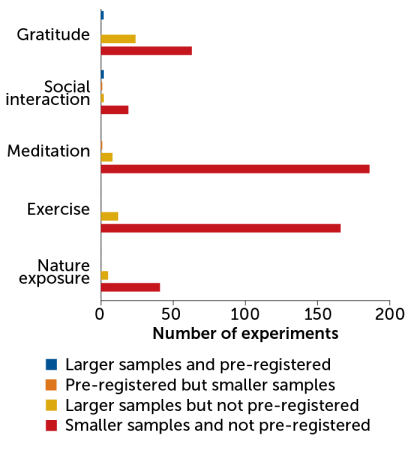Time in nature or exercise is touted for happiness. But evidence is lacking
A review of hundreds of studies finds limited rigorous research behind many happiness hacks

Many commonly recommended happiness hacks, like going out in nature, lack rigorous evidence to back them up.
Westend61/Getty Images Plus
Go on a run, hike through nature and meditate, and you’re basically guaranteed a happier life. At least, that’s what scores of listicles might lead you to believe. But a new review of hundreds of studies on happiness questions just how strong the evidence is for some of these happiness hacks.
The finding comes in the wake of the “replication crisis” in psychology, where the results of dozens of key psychological studies haven’t been able to be repeated (SN: 8/27/15). In response, scientists have reassessed reams of old studies and doubled down on the best practices for ensuring that new studies will hold up under scrutiny (SN: 8/27/18).
To find studies of happiness that applied these best practices, psychologists Dunigan Folk and Elizabeth Dunn of the University of British Columbia in Vancouver combed through hundreds of papers. The team focused on research that studied a large sample of people, which helps tease out real effects, and studies that were pre-registered, meaning that researchers outlined how they were going to conduct a study before starting it. That way, they can’t tweak it midway; it’s the scientific equivalent of calling your shot in pool.
Although studies of happiness were plentiful, studies that met these high standards were relatively scarce. And the evidence they offered, especially for exercise, meditation and time in nature, was weaker than one might expect, the researchers report July 20 in Nature Human Behaviour.
Science News spoke with Dunn to discuss happiness, how we can get better at studying it and what science says works — and doesn’t — to build a happier life. This interview has been edited for length and clarity.
SN: Why study happiness?
Dunn: Science has given us our most essential human advances. It’s because of science that we got to the moon, that we have substantially increased longevity, that we have COVID vaccines. The scientific method is what solves our greatest challenges, and so I want to apply that method toward understanding happiness.
I think of happiness as being kind of the ultimate outcome measure. You know, whatever else we might be interested in, what ultimately matters is: “Are people leading happy lives?”
For me, understanding happiness is one of the fundamental mysteries and challenges of human existence.
SN: What gave you the idea to look into these past studies of happiness?
Dunn: This research actually started with a question from a journalist who asked, ‘’These things we hear about in the media as being really important for happiness, like meditation and nature, how rigorous is the research behind those kinds of claims?”
I realized I didn’t know. We were inspired to go look at the scientific literature, really comb through it to understand how good the evidence is underlying commonly recommended strategies. We didn’t go in with an agenda, but rather just an open curiosity.
SN: So where did you start?
Dunn: First, we wanted to identify what strategies were most recommended to the public. So we googled phrases like “how to be happy” and identified media stories providing recommendations. Then we said, OK, these five strategies [practicing gratitude, meditating and being mindful, spending time in nature, being social and exercising] are really commonly recommended to the public as ways to be happier.
And then we combed through the literature and found every experiment that we could testing the effectiveness of these strategies for happiness. We wanted to look for studies that hold up to modern standards of what constitutes good evidence. We found over 500 studies examining these strategies, but fewer than 60 of them actually met contemporary standards for rigor.
SN: What did you find?
Dunn: The key takeaway here is that some of the strategies that have been widely recommended to the public as ways of improving happiness are not actually supported by very rigorous evidence.
What’s shocking to me is when we reviewed the literature on meditation, exercise and nature, of the hundreds of studies that we looked at, 95 percent of them didn’t include enough people that we would trust these studies by contemporary standards.
[Take exercise. Dunn and Folk found no study that both had a sufficiently large sample size and was pre-registered. They did find a dozen studies that included enough people to have meaningful conclusions. Five of those studies “found evidence that people feel happier after a single bout of exercise, but only in comparison with rather boring activities, such as sitting in silence or watching a documentary on bookbinding,” the researchers write in the paper. Similarly, the researchers found only four experiments that supported the happiness benefit of spending time in nature and had large enough sample sizes, though none were pre-registered either.]
Importantly, we’re certainly not saying that this is all snake oil. There are good reasons why these strategies should work. It’s just that there isn’t all that much rigorous evidence to show that they actually do work.
If something works for you, great. I’m not saying you should stop. It’s important to emphasize that if you’re, for example, dealing with an anxiety disorder and your therapist is recommending meditation, you know, we’re not saying ignore this advice. All we’re saying is that, for the average person trying to get a little bit happier, the evidence is maybe not there yet.
This is really a call to action to say, hey, we as researchers and as a society need to better understand these topics because they have been so widely embraced by the public and so widely disseminated by the media. We built our castles in the sky; you really need to get some foundations under them.
Assessing happiness studies
Of the hundreds of studies that experimentally tested common recommendations for happiness, only a handful met the gold standard for rigor (larger samples and pre-registered, in blue). Some have one or the other, and the majority didn’t have large sample sizes and weren’t pre-registered.
Common happiness hacks aren’t rigorously tested

SN: Even if there’s limited evidence, what’s the harm in, say, going for a walk in nature?
Dunn: Most of these behaviors, like going for a nature walk or meditating, require time and effort. And as somebody who has a child and job, I can tell you time and effort are not in super strong supply.
Particularly for people who are working multiple jobs and have a lot of family responsibilities, finding even 20 minutes on a typical Tuesday where they can do something purely for themselves that they think will make them happy [can be hard]. How they use that 20 minutes really matters.
And they should be getting the best scientific guidance you can possibly give them about how to make the most of that scarce resource of time and of energy.
There’s also a potential danger that people could [needlessly] feel like they failed. If they are like, “Well, nature and meditation make everybody happier, and they don’t work for me. I guess there’s nothing that’s gonna make me happier.”
It’s important that we not overstate the strength of the evidence behind these things.
SN: Did any strategies seem to work in making people happier?
Dunn: Gratitude comes out looking pretty good, and also chatting with strangers and acting more extroverted. I would always like for the evidence to be even stronger, but those are the strategies I would probably feel the best about recommending from our current review.
[There is “consistent evidence that people in diverse cultural contexts benefit from making gratitude lists,” Dunn and Folk write in the review paper. The researchers also found two studies that had large enough sample sizes and were pre-registered that found talking to strangers boosts mood. Another study that included enough people but wasn’t pre-registered had a similar finding.]
We have another paper in process where we looked at the best studies on happiness, meeting the modern gold standard. From that, there’s also pretty good evidence that spending money on others promotes happiness. And there’s good evidence that giving money to poor people makes them happier.
It’s not that [psychologists] know nothing about happiness. We do. It’s just that some of the strategies that have been so widely touted and disseminated are not actually among the sort of best and brightest to emerge from our field.
SN: Do you have personal practices that help you be happier?
Dunn: [My past research has shown a link between] generosity and happiness. One thing that I’ve done with a group of friends was privately sponsor a family of Syrian refugees. Without really intending it this way, it was the perfect application of all of my research, and was probably the most rewarding experience I’ve ever had.
I also work out every day. It does put me in a really good mood. But this research has given me perhaps some humility in recognizing that that was the case for me. It’s not like other people would experience necessarily the same benefit as I do from that experience.







